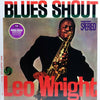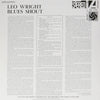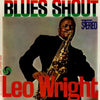





Leo Wright - Blues Shout
ORDER LIMITED TO ONE ITEM PER CUSTOMER
Side A : Leo Wright, flute / Harry Lookofsky, violin / Junior Mance, piano / Art Davis, bass / Charlie Persip, drums.
Side B : Leo Wright, alto saxophone / Richard Williams, trumpet / Junior Mance, piano / Art Davis, bass / Charlie Persip, drums.
Composed by Leo Wright (A1, B4), Earl Brent (A2), Matt Dennis (A2), Jacques Prévert, (A3), Johnny Mercer (A3), Joseph Kosma (A3), Al Dubin (A4), Victor Herbert (A4), Gigi Gryce (B1), Dizzy Gillespie (B2), Frank Paparelli (B2), Jerry Gladstone (B3), Russ Freeman (B3), Frank Paparelli (B3)
The arrangements for Sigi, Autumn leaves & Two Moods are by Leo Wright. All other arrangements are by Gigi Gryce
1 LP, standard sleeve
Limited edition
Original analog Master tape : YES
Heavy Press : 180g
Record color : black
Speed : 33 RPM
Record Press : Unspecified
Label : Pure Pleasure Records
Original Label : Atlantic
Recording : May 25 and August 29, 1960 by Tom Dowd & Phil Iehle
Produced by Nesuhi Ertegun
Originally released in 1961
Tracks :
Side A:
Side B:
Awards:
Audiophile Audition Best of the year Disc for 2017 - Selection Jazz
Reviews :
Most, if not all, jazz fans will recognize the name of Leo Wright. He played on many vital jazz albums as a sideman for the bulk of his career – always busy, always in demand due to his unerring sense of playing just the right phrase or note at just the right time. But Wright also had the chance to lead his own sessions beginning with this one in 1960. Here, Wright uses players who also spent the majority of their careers outside the spotlight, like Wright, as sidemen on other musicians’ albums, like pianist Junior Mance, bassist Art Davis, drummer Charlie Persip, and front line helpmates Harry Lookofsky on violin and Richard Williams on trumpet (on sides one and two respectively).
I should hand it to Atlantic Records, they seemed to be more willing than many labels to give lesser lights a chance to shine, and do so in the best sound possible. And kudos to Pure Pleasure for finding and recognizing that this album is fully deserving of proper reissue. No, “Blues Shout” won’t be the first jazz album you reach for, but it will (or should) certainly become one you listen to often, both for is wonderful musicality as well as it excellent sound. I know I’m glad I got the chance to hear it. Most highly recommended." John M. Crossett March 2017
"Leo Wright's Atlantic debut, "Blues Shout", effectively summarizes his career as a sideman, embracing the expressionist sensibilities of longtime boss Dizzy Gillespie as well as the Latin inspirations of longtime bandmate Lalo Schifrin to create a fiercely modern and uncommonly impassioned sound all its own.
Joined by pianist Junior Mance, trumpeter Richard Williams, bassist Art Davis, and drummer Charlie Persip, Wright divides his attention between his signature alto sax and flute, delivering a series of thoughtful and lyrical solos that positively radiate energy. The blues referenced in the title are more a feeling than a sound, underscoring the emotional intensity that bristles below the surface of every note." AllMusic Review by Jason Ankeny
"Many jazz greats emerged from their days with Dizzy Gillespie. Charlie Parker, John Lewis, Milt Jackson, Percy Heath, Kenny Clarke, James Moody, Quincy Jones and Les Spann all participated in various combos with Gillespie. In 1959 a young Texan named Leo Wright took over for Spain. In the Army, Wright had developed an assortment of musical skills, playing jazz, big band and was part of the symphony. He became proficient on alto saxophone, clarinet and flute. While attending San Francisco State, he got to sit in with Dizzy. After several recordings as a sideman, he was signed to Atlantic Records as a frontman. Here, Wright would develop as an arranger, composer and instrumentalist.
Wright’s brilliant Atlantic debut, Blues Shout has been re-mastered to 180-gram vinyl by Pure Pleasure Records. And this analog upgrade is worth it. Both sides of the album utilize a slight lineup adjustment that distinguishes it from the other. Side 1 opens with a Wright original, “Sigi”. A unison lead of flute (Wright) and violin (Harry Lookofsky) brings an exotic worldly glow as the song gets underway. The initial flute solo is crisp and jaunty. The stellar rhythm section (Junior Nance/piano; Art Davis/double bass; Charlie Persip/drums) is completely locked in. Lookofsky contributes a breezy violin solo that is fresh. When he and Wright reunite at the end, their chemistry is palpable. “Angel Eyes” (one of five arrangements by fellow alto saxophonist/ flutist Gigi Gryce) changes things with a slow-walking blues vamp (introduced by Davis). Nance’s first solo displays intricate phrasing and soulful elegance. Wright follows with a soaring run that elevates the jamming. Davis interacts with flute and violin effortlessly.
Changing the dynamic, “Autumn Leaves” is arranged for quartet (no violin). The melancholic classicism is captured in the intro as Wright reaches emotional depth. There is a potent transition to swing mode as the rhythm section joins in. Davis’ hard-charging double bass drives the cadence. Wright and Nance reconnect on a slower interlude at the end. Wright brings a rare artistry to his flute solos. “Autumn Leaves” has been covered in a wide array of styles. With flair, Wright and Davis explore the meditative romanticism as they open in tandem. A gentle swing break ensues, before Lookofsky’s solo. Davis gets an extended solo (32 bars according to the liner notes) with just a touch of accompaniment by Persip. Coming full circle, Wright and Davis team up after Nance’s piano riffs.
Trumpeter Richard Williams joins the ensemble on Side Two, changing the direction of the band. The title track kicks off with a cool, finger-snapping doublebass. Nance executes some trademark blues chops leading into Williams’ succinct, minimal vibrato trumpet. Wright switches to alto saxophone in a commanding, muscular representation. It is blues & soul jazz. The group combines for big band-reminiscent punctuations with a sly Count Basie ending. Paying homage to Dizzy Gillespie, “Night In Tunisia” is a complex wild ride. Touches like counterpoint between alto and muted trumpet are innovative and non-derivative. But the explosiveness of the bop masterpiece is front and center as the band unites. All the players get their moment to shine individually. The arrangement manages to showcase originality and embrace Gillespie. “The Wind” is another unexpected piece. It has a cinematic (film noir), haunting ambiance, with a wistful saxophone and elegant piano. The piece was first recorded in 1953 by Chet Baker as part of the West Coast Jazz movement. The finale (Two Moods”) is intriguing and creative. A moody ballad opens and closes the jam with an emphatic swing break in the middle. Williams unleashes a potent bop-influenced solo, and Persip offers an expanded solo.
The sonic aesthetics captured in the vinyl re-mastering are stellar. The gossamer tonality of the flute and supple richness of the alto saxophone (without any shrillness) are exemplary (Of course legendary engineers Tom Down and Phil Iehle provided excellent source material). The stereo separation (especially for 1960) is top-notch. None of the instruments get lost in mixing. The album notes by Leonard Feather are incisive and entertaining. Equipment aficionados will be pleased with the high fidelity recording details." Robbie Gerson, Audiophile Audition, Mar 16, 2017
Ratings :
Allmusic : 4.5 / 5


